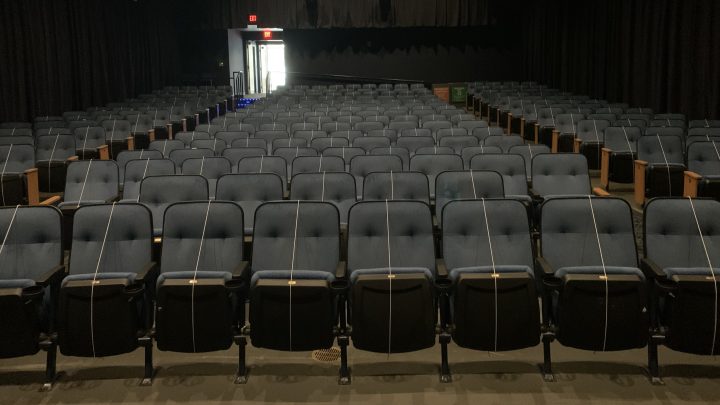
Despite challenges, this movie theater operator is optimistic about the future
Despite challenges, this movie theater operator is optimistic about the future

The Sundance Film Festival kicks off this week with online screenings, virtual events and some in-person viewing at more than 25 independent movie theaters across the country.
The Belcourt Theatre in Nashville, Tennessee, is among them and, like most movie theaters, it has faced unprecedented challenges this year due to the coronavirus pandemic.
Stephanie Silverman, the Belcourt’s executive director, is one of the 10 people “Marketplace” is following in our series the “United States of Work.” She talked with host Kai Ryssdal about how the Belcourt is getting by after nearly a year of pivoting. The following is an edited transcript of their conversation.
Kai Ryssdal: Standard first question, with a caveat here, how’s business, given that you’ve been closed since January the 1st?
Stephanie Silverman: Well, the movie ticket business is fairly slow, I will say, although we’ve got some great virtual films streaming, and people are watching them. And then this weekend, we’re rebooting our drive-in because the Belcourt is a satellite site for the Sundance Film Festival this year, so people will be outside in January in Nashville, which is not really that warm, but it’ll be fun to see audiences again.
Ryssdal: Does being a Sundance satellite thing, does that come with some cachet for you at the Belcourt?
Silverman: You know, they gave us some support to help hire people for panels and some other stuff. The ticket sales that are part of our film offerings, we do get to keep the revenue from those, so that’s superhelpful for us, for sure.
Ryssdal: To the brass tacks, then. I mean, you’re trying to get by, you can’t really do what you do for a business. What are you gonna do?
Silverman: Well, we are superexcited about this, you know, about the last federal funding bill, which had what was once known as the Save Our Stages program and it’s now called the Shuttered Venue Operators Grant. The application hasn’t opened yet, and it’s been about a month, but if that happens, I think it really will allow us to get through the next several months to the point where we are seeing much more widespread vaccination. It’s pretty clear that that is the piece that people are waiting on to feel comfortable about coming back into public spaces.
Ryssdal: Yeah, for sure. It was pretty clear-cut to you that after being open for a minute, as we talked about last time, you were on around Thanksgiving, you kind of had to close it down. I mean, there was no keeping it open, right?
Silverman: Yeah, I mean, the [infection] numbers got so severe…. It feels a little bit like we’re back into the unknown days of last year as we approach the one-year mark of being closed.
Ryssdal: Kinda unbelievable. We talked a lot in our first couple of conversations during the pandemic, about your staff and the care you were trying to take with them, acknowledging that a lot of them are low-wage workers to begin with. Have you been able to keep paying them?
Silverman: Yeah, well, we, we had a minute where we had to furlough some, we were able to bring a ton of them back on when we reopened, and right now, they’re still on the payroll. We’re keeping them paid. We all feel really committed to doing that for as long as fiscally possible. I mean, if we don’t pay them, they do not get enough money through other federal programs to be able to pay their rent, pay their utility bills and buy food.
Ryssdal: This is kind of an awkward turn, but let’s, let’s do it anyway. Let’s assume in a number of months that is somewhere in the single digits, fingers crossed, the vaccine is out and you are able to open up again. The movie industry has changed. It just has. This whole streaming thing is not going away, releases to online at the same time they’re in theaters is not going away. You worried about the Belcourt and its short- to medium-term future?
Silverman: You know, I hope this isn’t Pollyanna-ish, but I’m not. I really think that once people feel like they can be out in the world again, they will want to be out in the world again. And while streaming is a reality, it’s not communal, and communal still matters, whether it is dining in a restaurant or whether gathering in the parks with a ton of people around, going to festivals or watching a movie in a theater, I really think that that’s gonna matter in the long term.
There’s a lot happening in the world. Through it all, Marketplace is here for you.
You rely on Marketplace to break down the world’s events and tell you how it affects you in a fact-based, approachable way. We rely on your financial support to keep making that possible.
Your donation today powers the independent journalism that you rely on. For just $5/month, you can help sustain Marketplace so we can keep reporting on the things that matter to you.












